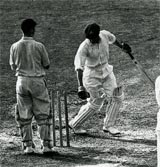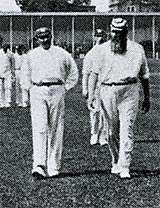Signing off with a whimper
Brian Lara's final innings ended in anticlimax, but he is not alone in not bowing out in fairytale fashion. Here are 11 other players who have departed with a whimper rather than a bang
|
|

|
Perhaps cricket's most famous duck. After a tour in the 1948 that was often more of a royal procession, Bradman walked out into the sunshine at The Oval for his final innings needing four runs to reach 7000 in Tests and ensure he finished his career with an average of 100.00. The crowd stood and clapped him all the way to the middle where he was met by the England side who gave him three cheers. He blocked the first ball from legspinner Eric Hollies, and then played all round a googly. There was a momentary stunned silence before what had happened registered with the crowd, then they stood and applauded him all the way back to the pavilion he had only left minutes earlier. Charles Williams in Bradman tells the story that in the press box, Bill O'Reilly and Jack Fingleton, two former team-mates of the Don's who had never got on with him, laughed so much as he trooped off that one eyewitness thought they were going to have a stroke.
Botham's last hurrah came at Lord's in 1992, but he had long since ceased to be a force at Test level. Clearly not in the best shape, he had broken down with a groin strain in the previous Test, and again injury - this time a bruised toe - made him a bit-part player. On the last day, with Pakistan needing 137, Botham (and Phil DeFreitas) was unable to bowl and England had to lean on three bowlers. They did reduce Pakistan to 95 for 8, but in the end the trio flagged. Botham was by then a passenger, and he dropped a shoulder-high chance at gully to add to his woes. "Botham was there," noted John Woodcock in The Times,"still a massive presence but now, unfortunately, a much less active one." Alan Lee, in The Guardian, echoed those sentiments, writing: "All that is left is a cricketer well past his physical and psychological prime." And with the bat, Botham was all at sea, cleaned up for 2 and 6 by Waqar Younis. His only solace came when he took a slip catch in Pakistan's first innings to equal Colin Cowdrey's English Test record of 120.
In his day a great keeper and pugnacious lower middle-order batsman, Healy's form with both bat and gloves fell away markedly in 1999, so much so that in his last 12 matches he averaged only 8.94. He returned from the tour of Zimbabwe with 395 international dismissals to his name, and, while realising his time was up, hoped the selectors would allow him to bow out in the first Test of the season at the Gabba, his home ground. They were having none of it, and he was replaced with Adam Gilchrist and immediately retired. "I think if you are a 100-Test player you deserve to walk off the field saying goodbye," he later observed. As it was, he bowed out with 5 at Harare Sports Club.
One of England 's greatest post-war batsmen and among the first of the game's commercial magnets, Compton 's career was increasingly troubled by a knee injury sustained before the war while playing for Arsenal. He had his kneecap removed in 1955 and, recalled for the final Ashes Test in 1956, he thrilled a packed Oval by making 94. But he made one more tour that winter to South Africa, and there was no fairytale finale. His Test career ended at Port Elizabeth with 0 and 5. Alan Ross wrote: "He struggled, a plain man in a world of riddles. Where he used to charm and delight, he was now silent. A gay, daring conversationalist who, having said all he had to say, still remained on at table, handsome, legendary but mute. One would have preferred, infinitely, that he had lost his wicket each time in daring rather than in the humble, dismissive role he felt somehow called on to play."
|
|

|
One of the game's greats for sure, but by the time the 1899 Australians visited he was almost 51 years old and, to put it mildly, portly. However, his form demanded his inclusion as captain, but, some three years since his last Test, it was soon evident he was simply too old and too immobile. He batted well enough in scoring 28 and 1, but CB Fry recalled that "we lost innumerable singles on the off side, and I never dared called WG for a second run to the long field". Even worse was that the Trent Bridge crowd barracked his fallibility in the field, a weakness Grace himself admitted, saying that "the ground was getting too far away". On the train home from the game, which England held on to draw, Grace, who was also a selector, told his close friend FS Jackson: "It's all over Jacker, I shan't play again." And so Grace, the England captain, stood down, having missed only one home Test since the first in 1880, and yet it was barely commented upon in the newspapers. The Sportsman merely noted that "the omission of his name will create little surprise".
West Indies ' selectors had raised more than a few eyebrows when they picked George Headley for the first Test of the 1953-54 series against England. He was 44 and had not played a Test for four years, but it was a sentimental selection to pick him on his home ground. When he batted, he was welcomed by what EW Swanton described as "an ecstasy of applause". England spread the field "as happens when a man comes in to bat in his benefit match" and gave him a single, a fact he acknowledged by doffing his cap. "Test cricket is an often grim, humourless business," Swanton wrote, "and it is pleasant to think there is still room for an occasional gesture of sentiment." It ended there. Headley made 16 and 1 and bowed out quietly.
In 1974-75, Thomson destroyed England with some of the fastest bowling ever seen. After a shoulder injury sustained in a collision during a Test in 1976, he was never quite as potent, but he was still good enough. But by the time he arrived for his fourth tour of England in 1985, he was a shadow of the terror he had once been. He played only two Tests, the first - where he took 2 for 166 - and the last at The Oval where in 19 overs he was smashed for 101. He did take one wicket, which was his 200th in Tests and his 100th against England, and a boundary catch to dismiss Botham that was accompanied by a no-nonsense gesture to spectators who had been baiting him all day. His only other contribution to the series was that he sported one of the worst bleached mullets to be seen on a cricket field.
For two decades Sobers had been one of the game's true greats, but by the time England toured the Caribbean in 1973-74 he was 37 and in decline, mainly because his body was ravaged by non-stop cricket. He played four of the five Tests, missing one through injury, and his final outing in Trinidad ended in defeat. In the first innings he was applauded all the way to the middle but made only 3. In the second, he came in with West Indies wobbling in a run chase. He scored 20 before playing all over a slower ball from Derek Underwood and being bowled. With him went West Indies' last hope of victory. He did have the solace of three wickets.
Two of England's best batsmen of the 1980s bowed out together at Perth, but for the 41-year-old Gooch and the 37-year-old Gatting it was a tour too far. There were highlights - Gatting's hundred in the fourth Test being the outstanding one, but in eight other innings he averaged 8.12. Gooch managed one fifty in ten innings. In the final Test they managed 58 runs between them - 18 less than their combined age, as one wag noted - and Gatting picked up a first-baller. In the second innings "together they stayed 26 balls and neither gave any compelling evidence why they should rescind their decisions to retire," wrote Mike Selvey. Gatting came in at No. 3 even though he had been off the field for all of Australia's innings. "Australia offered no objection," noted Martin Johnson, "presumably on the grounds that Gatting coming it at No. 3 made it more or less certain that they would soon be bowling at England 's No.4."
|
|

|
A truly great fast bowler, Donald was the backbone of the South Africa side in the decade after their readmission to the international fold. But by the millennium, his body was falling apart. He limped through a tour of Australia in 2001-02, but when the Australians visited South Africa a few months later, Donald broke down in the first Test and had to be carried off on a stretcher. In his last two Tests he had figures of 2 for 203. He continued in the one-day game, but what should have been a glorious swansong in the World Cup at home ended with another injury - he left the field against New Zealand in tears and with figures of 0 for 52 off 5.5 overs. He did turn out once more, in a stroll against Canada, but in three World Cup matches he took 1 for 133. "His career ended with him ferrying drinks out as 12th man," wrote Michael Atherton in The Daily Telegraph, "dropped for Monde Zondeki, a bowler who would not have been mentioned in the same breath a year or two ago. The lure of the fairy-tale ending proved too strong."
England's captain and golden boy fell from grace in 1977 when it was revealed he had been instrumental in the recruiting of players for Kerry Packer's World Series Cricket. In the space of days he went from pin-up to punchbag. Despite many arguing he should be dropped - some thought public disembowelment would not have been sufficient - England retained him in the side, albeit stripped of the captaincy, for that summer's Ashes. For a man who entranced and enraged crowds in equal measure, the end was quiet, a drive to gully at The Oval for a duck. It was widely thought at the time that the Packer link meant that it was the final outing for several others, including Alan Knott and Derek Underwood, but they played again post WSC.
Martin Williamson is executive editor of Cricinfo